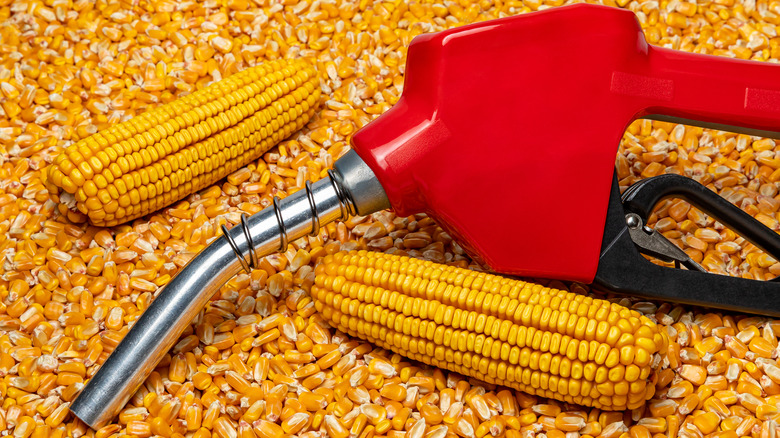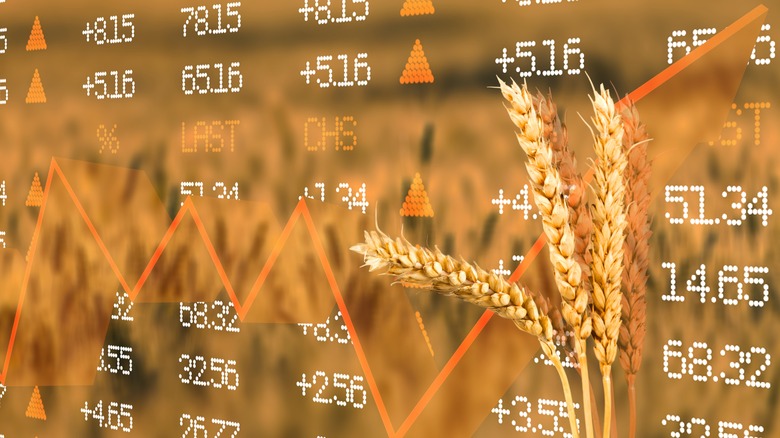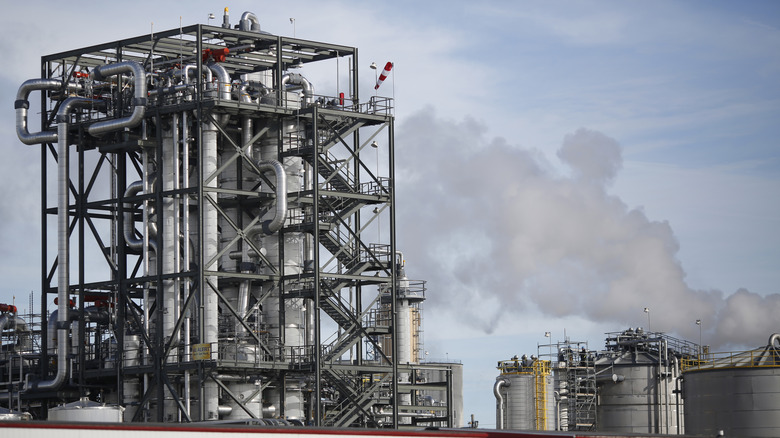How Biofuel May Be Worsening The Food Crisis
Between the lingering impacts of the COVID-19 pandemic and the geopolitical upheaval caused by Russia's invasion of Ukraine, economies around the world have been thrown into turmoil with prices from everything from food to gas to rent skyrocketing. According to Quartz, inflation is up by about 6% worldwide, while prices in the U.S. had risen 8.5% over the previous year by March.
Driving concerns for consumers are the seemingly ever-rising prices of food and gas. AAA reported on June 6 that the average price of gasoline in the U.S. was $4.86 per gallon, an issue which CNN notes is likely to cause Americans to cut back on other spending. In order to curtail the increases, President Joe Biden announced in April that he would temporarily allow the sale of gas with a higher blend of corn ethanol. CNBC notes that ethanol blends higher than 10% are usually banned in summer to combat smog production, but this will be waived this year in hopes of saving families up to 10 cents per gallon on gas, according to the White House.
Unfortunately, this effort could exacerbate the other half of the world's inflated food prices. Forbes reported in May that prices of popular food items, including produce and meats, have risen 14.3% since last year. Add to that a UN estimate that nearly 49 million people are currently at risk of severe food shortage, and burning crops may seem like a worse solution.
Worsening a shortage
Much of the increase in food prices has been driven by climate change and the Russia-Ukraine conflict. Both Russia and Ukraine, as well as Russia's ally Belarus are major suppliers of agricultural products including wheat, corn, barley, sunflower oil, and minerals used for commercial fertilizers (per Our World in Data). With Ukraine's exporting ability greatly diminished and much of the world boycotting Russian exports, crops from the rest of the world should have filled in the gap. However, according to Time, floods and droughts in the U.S., Canada, India, China, and the EU have contributed to a world shortage of grains, particularly wheat.
Global grain shortages have led to an increase in prices from everything from bread to animal feed, leading some to question the wisdom of using what excess crops we have produced to cut gas prices. An opinion piece in Reuters argued that if the U.S. and Europe — which last year used 5 billion loaves of bread's worth of wheat for ethanol — were to scrap mandates for increased biofuels, even temporarily, the world food supply would no longer be critical, easily making up for the deficit created by Russia and Ukraine. The article also pointed to a study which suggested that, despite its initial purpose of reducing greenhouse gas emissions from the burning of fossil fuels, the U.S. ethanol program may be more environmentally detrimental than beneficial because the difference in carbon emissions is small and creates land use and water pollution issues.
An ongoing problem
Once the conflict in Ukraine is resolved and the food supply chain stabilizes, some argue biofuels are still an irresponsible use of resources. According to Canary Media, the amount of corn required to fuel an SUV with ethanol could be used to feed a human for one year. Even as food needs increase with the growing world population and climate change continues to complicate growing seasons, the U.S. and Europe are pledging to use more biofuel to limit gas consumption, meaning more farmland will be needed to supply the grains necessary to provide food and fuel, a measure which Canary Media argues will lead to more deforestation and worsening climate conditions.
Corn and wheat aren't the only crops which could be impacted by this issue. Currently, Brazil is demonstrating the negative tradeoff with sugar. Thanks to India taking somewhat overcautious measures to protect its own food supply by limiting exports of sugar, the world is facing a potential spike in sugar prices or a massive shortage. While Brazil could make up for India's decreased output, Reuters has reported that many of the country's sugar mills are canceling export contracts in order to divert crops to biofuel production and cash in on the energy cost crisis.
If major economies don't accept the fact that biofuels are not the answer to reducing oil dependence, we may soon be facing a bigger crisis than high gas prices: an increased global shortage of food.


